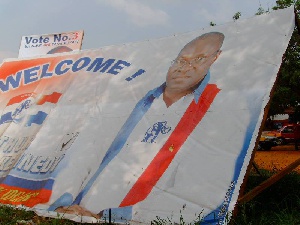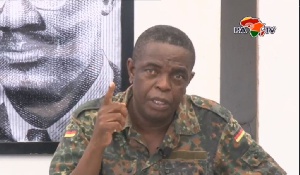- Home - News
- TWI News | TV
- Polls
- Year In Review
- News Archive
- Crime & Punishment
- Politics
- Regional
- Editorial
- Health
- Ghanaians Abroad
- Tabloid
- Africa
- Religion
- Election 2020
- Coronavirus
- News Videos | TV
- Photo Archives
- News Headlines
- Press Release
Opinions of Saturday, 22 December 2007
Columnist: Asiedu-Young, Bellinia
Arthur Kennedy
When the cries of the children and the women reach God - Arthur Kennedys of this world are sent.
While most of us in the Diaspora seem to have finally come to terms with our past history and seem to be at peace with ourselves, it has not always been like that when we first arrived in our respective adoptive countries in the mid 80’s. In those days, we spent countless and agonizing moments arguing about the situation we had left behind. Few people like Arthur Kennedy on the other hand, spent the greater part of their time trying to recoup and reclaim what they had lost in the process of speaking against a system that was less than perfect.Memories of my motherland: The Diaspora as a vessel for change - this particular scenario had already been pre-set for us. I will only recount to you little of what I know just to give you an idea of what I’m talking about. I was an eyewitness! Back in the late 70's and early 80's those of us in the Akwapim ranges watched in horror as things fell completely apart. The excellence that we had been told to emulate was only an illusion. It was right under our noses, it was nothing that happened to most of us in particular, but the human suffering, oversight and recklessness that descended on Ghanaians is something we have vowed to ourselves to this day to fight until our last breath so that Ghana will never go that way again. I remember this very clearly, especially NUGS and the students who risked their lives and fought both tooth and nail, to point out the ills that were going on. During one school recess, I remember waiting in the mornings for my Dad's Daily Graphic delivery to find out what NUGS was doing, I remember discussing these developments with him every evening. NUGS really became the voice and the hope of the real people. I honestly do not think we can blame any one person in particular for these mishaps, but we can blame a system that emerged in those days with some becoming the scapegoats for it. I find that it is sometimes easy to mistakenly apportion blame at the wrong doorstep when we try to figure out what exactly happened in those days, I think what happened had more to do with a whole social, cultural, political system collapse than anything else. It does not help our nation to move forward at all when we lay the blame on individuals. In retrospect, it seems it was rather mutiny that gave way, due to dissatisfaction and the feeling of lack of respect and being undervalued and ignored on the part of the junior ranks within the military that caused this military upsurge - with civilians paying the ultimate price. "When the cries of the children and the women reach God................…". Those were my Dad's words to me back then, I don't remember the rest of it, but I remember the agony in his voice. In those days, men worried daily about their children, wives, mothers, sisters and daughters. When Mrs. Koranteng-Addow (High Court judge) was kidnapped with the others and killed, Ghanaians for the first time discovered not even the women were protected against the type of aggression that had descended on us. Mrs. Koranteng-Addow's husband is from Akropong, Akwapim, where I lived throughout my childhood, so this hit too close to home, the whole town was gripped with pain, the same pain that gripped us when Gen. FWK Akuffo faced the firing squad, the same that gripped the town when Mr. Bismarck (a respectable Aburi chief also native of Akropong, who spoke against the aggression) disappeared into thin air, and the many other "faceless people" who have to this day disappeared.
Another person accounts, “Ghanaians became hopeless, lawless and demoralized. We were beaten into silence by the military that is supposed to uphold and protect our democracy and our land against outside aggressors. We had no way of defending ourselves against the fully armed military who saw this as an advantage to settle their own personal scores.” The last straw for me: I've seen a person gunned down in Accra, on the street in front of the Canadian High Commission, right before my very own eyes, and in a matter of seconds scooped up into a military vehicle before I've had time to absorb what had happened, I've had a school mate with a bright future, just out of 6th form, go home and within a week, died of a stray bullet from a soldier. Then a very young girl, I'd watched in horror as respectable men, my uncle a businessman, my friend's Dad, a business man, a neighbour’s husband, a medical doctor, and many others taken to Burma Camp to have their heads shaved with broken bottles. I'm yet to find anyone to convince me this is not lawlessness. Even though, the women were hit very hard and cried daily for the children, I can only imagine the desperation that the men felt and prayed, hoping they will never have to live the horror of watching a family member molested. When I was ready to leave Ghana, my father bade me goodbye and painfully told me, "Go and be a good person and make Canada your permanent home", and from my brother, "Baby, do not ever come back, you do not belong here". The only memory of Ghana I was to carry with me when I departed Ghana was a book written by the now presidential aspirant, Mike Oquaye "Politics in Ghana 1972-1979". I needed something in print to convince me I was not making these things up. I needed something to show the world and my children that I'm not the only person dreaming this up. I needed something to help me to understand what has just happened to us as a people (I'm yet to find the 2nd part of this book which I hear is in hard print). When I left Ghana, I never looked back until now.............................
A very good friend of mine has concluded that, “There is no way we could have prevented what happened. And the sad reality is that if it were to happen again today, we cannot prevent it, because anyone today can still take the laws into his or her own hands provided they have people at key positions to collaborate with them using guns. The laws we have now have no power or fortification against guns in the hands of the military or anyone. The Chief Justice and all the lawmakers are still as vulnerable as the Judges who were kidnapped and murdered. We still have no special force in Ghana that is trained well enough to prevent a coup d’etat. Such is our poor planning and plight. If civilians were the ones to save President John Kuffuor as reported in the recent car accident, it goes to prove, we’re still vulnerable.”
Where does Arthur K fit in all these. Arthur K. as he’s mostly referred by most is a simple person, quiet and unassuming. His humble background coupled with his alertness and grasp of human suffering, has made him very sympathetic to the human condition in a way that most people who have found themselves in similar positions are oblivious. If we put Arthur K at the helm of affairs, he will ask for excellence and nothing else. Arthur K symbolizes the puzzle to our leadership dilemma. He has allowed himself to pass through a severe test similar to that used by the goldsmith to polish a gold piece. He’s seen as one who has long sacrificed and submitted himself to go through all the obstacles to be polished over and over again in a crucible, to the point where he’s finally come out shining and clean. He is ready now, and Ghana needs him as its leader.
One sympathizer who identifies himself as an independent voter wrote to me, “Ghana needs a leader not a politician to lead the country - someone with foresight, vision and capability like Dr. Arthur Kobina Kennedy, who is truthful, capable and inspiring. He will prove to be the voice of the people of Ghana who need change – a caring leader with integrity, accountability and credibility”. Time is of the essence now. Please pass this on to your friends for a discussion, or print and distribute in Ghana before the NPP congress. Please point this out to possible NPP delegates to let them know the Diaspora is rallying hard behind them, and that we expect them to vote for the future, and that our hearts bleed everyday. For us, the litmus test is over, we’re ready to help move our country forward for ever.












